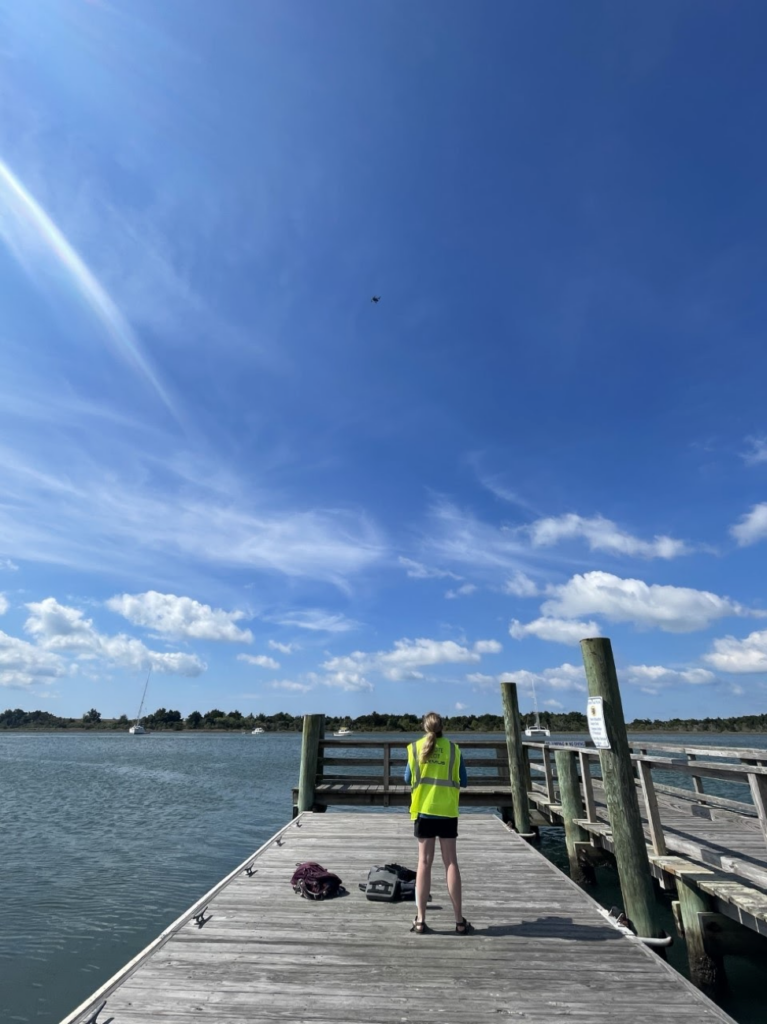Peggy Mullin is a 2019 graduate of the UNC Institute for the Environment. She is currently a research technician both for the Carolina Drone Lab (CARDNL) as well as the joint UNC-IE and NOAA Effects of Sea Level Rise “Keeping it in the System” (ESLR/KITS) project.
It’s a Bird! It’s a Plane!
If you’ve been anywhere scenic in the past few years, there’s a solid chance you’ve encountered a distant humming – not quite bee, not quite cicada – only to soon spy a drone flying overhead. Drones are everywhere now, doing everything from taking pictures at backyard barbecues to performing coordinated mid-air “dance routines” to kick off the 2021 Olympic Games.
Drones are typically small aircraft, designed for remote controlled flight via a ground based controller. The concept of remotely controlled aircraft is not new, but consumer-grade drones have gone through something of a genesis in the past 10 years. Now, instead of a luxury reserved for the very wealthy, drones of all shapes and sizes are becoming accessible to pilots of all ages, allowing innovation to take to the skies like never before.
Some see them as the next great innovation while others view them as a nuisance, but the fact is: drones are here to stay. So how can we best use this technology for the common good?
At the Carolina Drone Lab, or CARDNL, we look to do just that. By making drones and remote sensing technologies available to the wider Carolina community, we aim to be a hub of research and innovation for anyone interested in getting a bird’s eye view of their area of research.

Gearing Up for Takeoff
The Carolina Drone Lab started as just an idea. When I was a student about to graduate in 2019, I heard of some faculty interested in bringing drones into the research realm, but nothing beyond a few mentions in passing. This idea became much more real when, in 2020, Dr. Susan Cohen and Dr. Geoffrey Bell of the UNC Institute for the Environment received a Lenovo Instructional Innovation Grant through the UNC Center for Faculty Excellence. This funding allowed the team to host a drone workshop for both students and faculty in 2020. The interest in the workshop encouraged Dr. Cohen to pursue the formalized establishment of a drone lab at UNC, and several months later, CARDNL was born.

Our central team (at time of writing) is very small, consisting of just five people: Dr. Susan Cohen, Troy Walton, Fleming Talton, myself, and our 2021 fall intern, Aivry Coleman. We may be few, but we are mighty; despite this September marking only a year since we started off, we have already worked with researchers and partner organizations up and down the East Coast, from local universities like Duke and ECU to national organizations like the EPA, DOD and NOAA. We are also fortunate to have a network of local collaborators like Duke’s Marine Robotics and Remote Sensing Lab (MaRRS) and Attollo UAS who are world-renowned for their expertise in their fields.

New Horizons
Especially as we enter into a new (live and in-person!) academic year, CARDNL hopes to become a resource for anyone affiliated with UNC who is interested in drones. We’re continuing our monthly Free Fly Fridays series, where we invite anyone interested in flying drones or learning more about our platforms to come out for an afternoon at Horace Williams Airport in Chapel Hill. We also hope to link up with professors and their classes, to host workshops, and to solidify ourselves as an on-campus resource to help fledgling ideas take flight.
If you’re reading this and would like to connect with us, please reach out! You can email the lab using drones@unc.edu or check out our website for more information at www.tarheels.live/drones.

